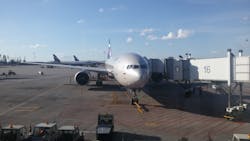Russia’s Ground Handling Industry is on the Verge of Breakthrough
Ground handling in Russia is steadily developing, which is reflected by the rapid introduction of new technologies and the end of the de-monopolization process within the industry, according to recent statements from leading ground handling operators and representatives of airports across the country.
In recent years, the level of quality of ground handling services provided at Russian airports has significantly improved. This has become true mainly due to large funds invested by airports and ground service providers in order to increase the technical level of their ground operations, which, in turn, resulted in the attraction of more foreign airlines.
Perhaps the biggest progress in this field was achieved by Moscow-based JSC Sheremetyevo International Airport, Russia’s largest airport in terms of annual passenger traffic.
Several weeks ago, the airport – together with the Russian flagship airline Aeroflot and the local State Corporation for Air Traffic Management (which is an organization that provides air navigation services in Russia), has officially introduced a set of new methodologies and as well as control scenarios designed to address all types of failures during the conduction of ground handling activities within the territory of the airport and to prevent possible emergencies.
This involved the installation of a new joint decision-making system, known as A-CD, which combines the activities of airports, airlines and air traffic control units.
According to First Deputy General Director of Department of Production of Sheremetyevo Airport Andrey Nikulin, the system was developed on the basis of a single information platform “Synchron.” Its introduction resulted in a 30-percent reduction of the time required to taxi aircraft from landing to the arrival zone. In addition, installation of the new system resulted in a 35-percent reduction in the time for taxiing from parking place to take-off zone.
Finally, total savings of aviation fuel as a result of introducing new technologies in Sheremetyevo were equivalent to 320,000 tons per year.
Nikulin also points out the airport has developed 17 training cases and, together with its ground handlers, conducts weekly trainings of the alert level of its ground handling services. That helps make ground handling processes in Sheremetyevo more predictable and manageable in the case of any failures or emergency situations.
Moreover, this year Sheremetyevo completed installation of certain IT solutions, which allow users to monitor ground handling activities on the basis of almost 900 parameters, covering both standard and emergency situations. The IT systems collect the data of current ground handling operations at the airport, and transfer the data to a single information field of Sheremetyevo, which is located at its control center. From there, relevant decisions are made.
While Sheremetyevo has become the only Russian airport to utilize ongoing technical improvement of its ground handling operations, implementation of similar plans have been recently confirmed by representatives of other major airports.
In recent years, many leading Russian airports have significantly optimized the procedure of aircrafts’ deicing.
“During the period of the autumn-winter navigation, the deicing protection of almost all aircrafts was carried out with the engines running,” says Evgeny Petrov, a senior instructor for deicing at the Moscow Domodedovo Airport. “As part of the plans of Domodedovo is a gradual transition to the treatment with anti-icing fluid of more aircrafts of different types on the same site at one time. In addition, the airport plans to use those deicing technologies that will fully comply with the existing legislation in the field of environmental protection in Russia and Europe.”
While the quality of ground handling services at Russian airports is steadily growing, more efforts need to be taken in order to further improve the situation in the industry.
The biggest concerns of both ground handlers and airports in Russia is related to the current national legislation in the field, which many feel remains too restrictive.
According to some Russian ground handlers, there is a need to provide additional manpower to both ground service providers and airports, especially in the case of bad weather conditions. According to a Sheremetyevo spokesperson, airport officials have recently prepared and sent a number of legislative initiatives to the Ministry of Transport of Russia.
Representatives of airports believe the introduction of legislative changes will help raise the efficiency of airport management, especially in difficult situations, and possibly prevent tragedies similar to those that occurred in the Moscow Vnukovo Airport in 2014, when a Dassault Falcon 50 hit a snowplow on take-off, which resulted in its crash and death of all four people on-board.
In the meantime, in addition to further modernization of the industry’s legislation, other measures should be implemented in order to improve the current situation in the industry.
“The recently completed de-monopolization of the Russian industry of ground handling services, which affected Domodedovo and other Russian airports is just the beginning of a long path,” says Marina Bukalova, marketing director of Moscow Domodedovo Airport. “The second step is to create rules for the authorization of ground handlers to operate at airports. As part of these plans, there is a need to design requirements for a minimum level of quality of services provided. Together with our colleagues in the industry, we are developing proposals for the introduction of further changes in the existing regulatory framework in the field of ground handling in Russia.
“One of the proposals is creating a two-level system of admission of ground handlers to operate in the airport. It involves certification and qualification of personnel of the main airport operator, that will further responsibility for the admission of third party ground handlers to operate within the territory of the airport.”
In the meantime, despite the efforts, which have been implemented by leading Russian ground handlers and airports to optimize ground handling activities in the local market, there are several problems, which continue to prevent rapid development of the industry.
One is high prices for services at Russian airports, which are significantly higher than tariffs in other European airports. This has been confirmed by representatives of some leading airlines operating in Russia.
According to recent statements of Yanne Suomalainen, an official spokesman of the Finnish flagship airline Finnair, high tariffs currently remain one of the most pressing problems of the Russian industry of ground handling.
As Suomalainen said during the recent Ground Handling at Airports Conference in Moscow, high tariffs are not the only major problem of Russian airports. Additionally, the work of personnel is a factor.
“Many staff members, which provide ground handling services at Russian airports, work well only under a strict control of a their management and representatives of airlines,” Suomalainen explains. “As a result, we have to use our representatives to observe the usual routine work of ground handling operators in Russia.
“The second problem, connected with the local staff, is that a very few people speak English. Ground handling workers should be able to communicate both with the crew and with passengers, while very often it is impossible due to a language barrier.”
In the case of language aspects, representatives of other foreign airlines operating in Russian airports say there are existing problems with documentation. In a significant number of Russian airports, documentation is available only in Russian, which forces airlines to use the services of translators, which significantly delays the entire process.
However, airline representatives also point out the Russian government was able to end monopolistic activities of certain ground handlers at some airports. Yet, the problem still exists at airports in small, provincial cities.
According to airlines, lack of competition leads to high prices, which can be as much as three times higher than airports of other countries.
In addition, lack of fixed rates also sparks criticism from airlines, according to which prices may significantly vary for the provision of similar ground handling services for the same type of aircrafts in different Russian airports.
Moreover, often airlines, which receive ground handling services in Russia, have to pay separately for each type of work, which means the need to document each process separately, which greatly increases labor costs.
About the Author

Eugene Gerden
Eugene Gerden is an international freelance writer, who specializes in covering the global aviation and ground handling industries. He has worked for several industry titles and can be reached at [email protected].
